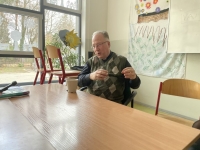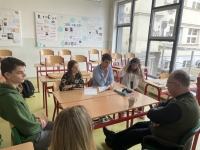We took the Velvet Revolution out of Prague
Stáhnout obrázek
Vojtěch Eliáš was born on 2 March 1967 in Liberec, immediately after a year his parents moved to Prague. He grew up in the Catholic faith and from childhood he longed to become a priest. He thought about several cover jobs, finally in 1985 he decided to apply to the then Cyril and Methodius Divinity School in Litoměřice. The decision to accept him caught him on his way to Rome, where he was already determined to emigrate. He returned and joined the CMBF, where he found it difficult to endure the atmosphere of secret informing. In his final year, the revolutionary year of 1989 arrived. Vojtěch Eliáš, as a seminarian, first participated in the canonization of Agnes of Bohemia in Rome on 12 November, then secured the blessing of Cardinal Tomášek, and as a leader involved the divinity students in the Velvet Revolution. In Litoměřice, he became chairman of the strike committee, distributed leaflets and organised meetings in the north-western towns. After the victory of the revolution, he considered staying in politics, but eventually decided to become a priest. He was ordained in 1991 at just twenty-four years old. During his lifetime, he held many ecclesiastical and academic positions, from personal secretary to Cardinal Tomášek and episcopal vicar, to president of the academic senate of the CDF and vice dean for studies, to president of the Archdiocesan Charity. Since 2015, he has also been a canon of the St. Vitus Chapter. As a parish priest, he has served parishes in Pribram, Hostivice, St. Ludmila‘s on Náměstí Míru in Prague and even in Wimbledon, England. Since 2018, he has been the administrator of the parish of Horní Počernice at the Church of St. Ludmila in Chvaly.

